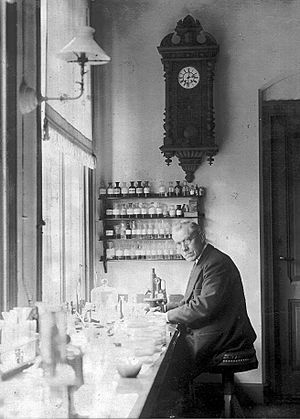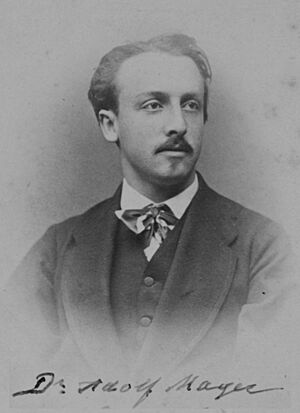Virology facts for kids
Virology is the study of viruses. Viruses are tiny germs, much smaller than bacteria, that can make people, animals, and even plants sick. Think of them like super small invaders!
Scientists who study viruses are called virologists. They learn how viruses work, how they spread, and how to stop them. Their work is super important for keeping us healthy.
Contents
What is Virology?
Virology is a branch of microbiology, which is the study of very tiny living things. Virologists focus only on viruses. They try to understand everything about these microscopic particles.
This includes:
- What viruses are made of.
- How viruses infect living cells.
- How viruses make copies of themselves.
- How viruses cause diseases.
- How our bodies fight off viruses.
- How to create medicines and vaccines to prevent or treat viral infections.
What are Viruses?
Viruses are not exactly living things in the same way that plants or animals are. They are more like tiny packages of genetic material (either DNA or RNA) wrapped in a protein coat. They cannot grow or reproduce on their own.
To make more copies, viruses need to get inside a living cell, like one of your body cells. Once inside, they hijack the cell's machinery to make new viruses. This often harms the cell and can lead to sickness.
How Viruses are Different from Bacteria
It's easy to confuse viruses with bacteria, but they are very different.
- Size: Viruses are much, much smaller than bacteria. You can see bacteria with a regular microscope, but you need a powerful electron microscope to see viruses.
- Structure: Bacteria are single-celled organisms that can live and reproduce on their own. Viruses are just genetic material in a protein shell and need a host cell to survive.
- Treatment: Antibiotics can kill bacteria, but they do not work against viruses. Different medicines are needed for viral infections.
The History of Virology
People have known about diseases caused by viruses for a very long time, even before they knew what viruses were. For example, smallpox has been around for thousands of years.
The actual study of viruses began in the late 1800s.
- In 1892, a Russian scientist named Dmitri Ivanovsky described a plant disease that could be passed on by something even smaller than bacteria.
- Later, in 1898, a Dutch scientist named Martinus Beijerinck called this mysterious agent a "virus," which means "poison" in Latin. He showed that it could reproduce only inside living cells. This was a big step in understanding viruses.
- Another important person was Adolf Mayer, who also studied the tobacco mosaic disease in plants.
Over time, scientists developed new tools, like the electron microscope, which allowed them to finally see viruses for the first time in the 1930s. This helped them learn even more about these tiny invaders.
Fighting Viruses: Vaccines and Treatments
One of the most important jobs of virologists is to find ways to protect us from viral diseases.
Vaccines
Vaccines are a major way we fight viruses. A vaccine teaches your body's immune system how to recognize and fight a virus before you even get sick. This way, if you ever come into contact with the real virus, your body is ready to defend itself.
Virologists have developed vaccines for many common and dangerous diseases, including:
Antiviral Medicines
Sometimes, if you do get a viral infection, doctors can give you antiviral medicines. These medicines work by stopping the virus from making copies of itself or by blocking it from entering your cells. They are different from antibiotics, which only work against bacteria.
Why Virology is Important
Virology is a very important field of science because viruses affect all forms of life.
- They cause common illnesses like the common cold and the flu.
- They can cause serious diseases like HIV/AIDS, Ebola, and COVID-19.
- Viruses also affect animals and plants, which can impact our food supply.
By studying viruses, virologists help us:
- Understand how diseases spread.
- Develop new ways to prevent and treat infections.
- Protect public health around the world.
Their work helps us stay healthy and safe from tiny, invisible threats.
Images for kids
See also
 In Spanish: Virología para niños
In Spanish: Virología para niños
 | Janet Taylor Pickett |
 | Synthia Saint James |
 | Howardena Pindell |
 | Faith Ringgold |




